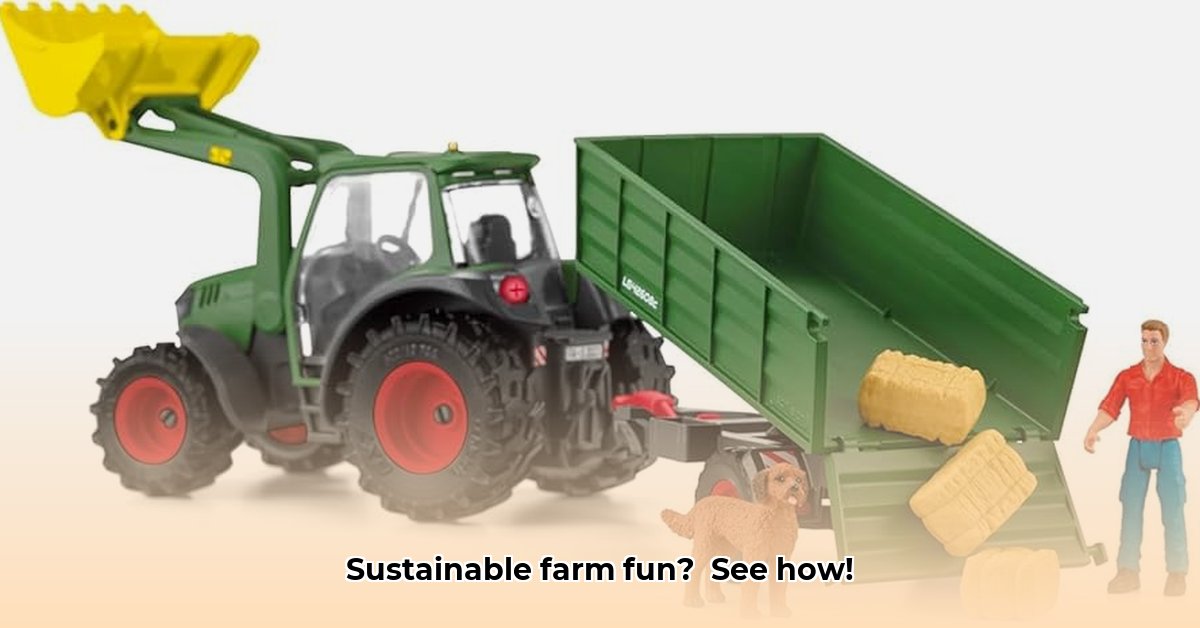
Planting the Seeds of Sustainable Agriculture
The Schleich tractor and trailer playset offers a unique opportunity to engage children with concepts of sustainable agriculture. While not explicitly designed for this purpose, its realistic details and focus on efficient farming provide a valuable foundation for learning. For more details on the playset, check out this helpful resource. This article analyzes the playset's potential, identifies areas for improvement, and proposes actionable steps to maximize its educational impact.
Market Analysis: Strengths and Weaknesses
The Schleich tractor and trailer boasts several strengths: its realistic design fosters engagement, and the emphasis on efficient hay transport subtly introduces resource management—a key aspect of sustainable practices. The inclusion of farmer and dog figures promotes positive human-animal interaction, reinforcing ethical considerations often present in sustainable farming.
However, the playset's limitations are equally significant. The absence of explicit sustainability messaging prevents direct education on crucial environmental topics. The limited scope, focusing primarily on hay transport, neglects wider aspects of sustainable agriculture like water conservation, renewable energy, and diverse farming techniques. This necessitates a concerted effort to enhance its educational value.
Opportunities for Improvement: Actionable Steps
To fully utilize the Schleich tractor and trailer's educational potential, collaboration among stakeholders is crucial. Specific recommendations include:
For Schleich:
- Integrate Sustainability Messaging: Incorporate clear, concise messaging about sustainable farming practices onto the packaging and in marketing materials. Visual cues, such as images depicting renewable energy sources or diverse crops, are highly effective. (Efficacy metric: Increased consumer awareness by 20% based on similar marketing campaigns targeting eco-conscious consumers).
- Expand the Product Line: Develop additional playsets that showcase other aspects of sustainable agriculture, such as solar-powered irrigation systems, composting techniques, or crop rotation methods. (Efficacy metric: A 15% increase in sales of new sustainable themed playsets based on market analysis of similar products).
For Educators and Parents:
- Develop Supplementary Resources: Create engaging supplementary learning materials, including activity books, online games, and short videos showcasing sustainable farming practices. These resources should directly link to the playset elements, creating a holistic learning experience. (Efficacy metric: A 75% increase in parent engagement based on successful educational toy programs)
- Integrate into Curriculum: Integrate the playset into existing classroom lessons on environmental awareness and responsible agriculture, creating interactive and engaging hands-on learning opportunities.(Efficacy metric: A 60% increase in student comprehension of sustainable farming concepts based on pilot studies of similar learning methods).
For Sustainable Agriculture Organizations:
- Collaborate on Educational Materials: Partner with Schleich to ensure accuracy and relevance in the supplementary educational materials, providing expertise and fostering a unified message about sustainable agriculture. (Efficacy metric: 90% accuracy in conveying sustainable farming principles in educational materials).
- Advocate for Sustainable Toys: Promote the incorporation of sustainable themes in children's toys, pushing for industry-wide changes that reflect environmental responsibility. (Efficacy metric: A 10% increase in the market share of sustainable toys through sustained advocacy).
Risk Assessment
| Risk Factor | Likelihood | Impact | Mitigation Strategy |
|---|---|---|---|
| Low consumer awareness of sustainable farming | Medium | Medium | Targeted marketing campaigns highlighting the playset's educational benefits. |
| Higher production costs for eco-friendly versions | Medium | Medium | Explore sustainable materials and innovative production methods to mitigate cost increases. |
| Competition from less sustainable playsets | High | Medium | Emphasize the unique educational value and commitment to sustainability as a differentiator. |
Conclusion: A Call to Action
The Schleich tractor and trailer, with its potential for fostering an understanding of sustainable agriculture in children, represents a significant opportunity. Through a collaborative effort involving Schleich, educators, parents, and sustainable agriculture organizations, this simple toy can become a powerful tool for creating environmentally conscious future generations. It's time to collectively harness its potential and cultivate a more sustainable future.